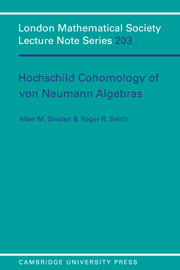6 - Continuous Cohomology
Published online by Cambridge University Press: 29 September 2009
Summary
Introduction
The continuous cohomology from a von Neumann algebra into itself is the principal topic of this chapter. The technical tools required in the proofs have been developed here, as in the last chapter, with a view that they may be useful in other von Neumann cohomology calculations.
The main technical result (6.2.1) of the second section is reminiscent of the theorems of Chapter 3, in that it says that continuous and completely bounded cohomology are equal under suitable hypotheses. This enables us to reduce continuous cohomology from a von Neumann algebra into dual normal modules to the completely bounded case when the algebra is type II∞, III, or II1 and stable under tensoring with R, and the module is an operator space with multiplication. The possible difference between completely bounded and continuous cohomology thus lies in the algebras of type II1 that are not stable under tensoring by R.
By analogy with Lie groups, a Cartan subalgebra A of a von Neumann algebra M is a masa A whose unitary normalizer generates M as a von Neumann algebra. The automatic complete boundedness conditions of Section 1.6 and the averaged Haagerup–Pisier–Grothendieck inequality (5.4.5) show that, with the Cartan algebra hypothesis, suitable cocycles are completely bounded.
- Type
- Chapter
- Information
- Hochschild Cohomology of Von Neumann Algebras , pp. 146 - 159Publisher: Cambridge University PressPrint publication year: 1995



